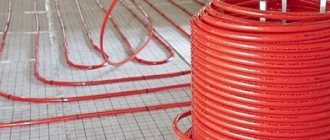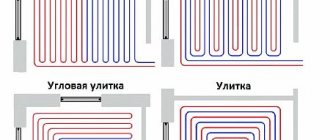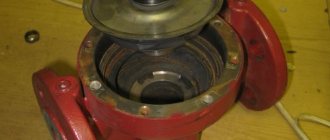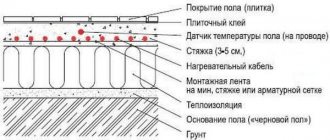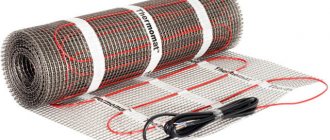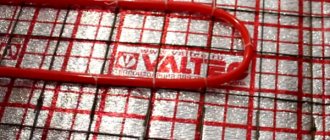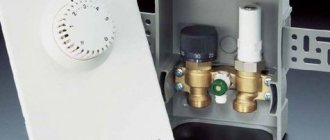Warm floors are a modern heating system that creates comfort and coziness in living spaces. This is achieved by saving working space and uniform heat distribution. The most popular heating system is the electric floor. Its main advantage is ease of installation. In the event of a breakdown, repairing an electric heated floor is not difficult, although there are certain difficulties.
Electric heated floors are the most popular and their repair is simple.
Three main reasons for underfloor heating failure
The heating design is a reliable system. The period of use of heated floors, according to the specified technological parameters, without major repairs is designed for a minimum of 10 years. Although every electrical device that is constantly in use has not only its advantages, but also possible technological disadvantages. Causes of heating malfunction:
- thermostat;
- electrical cable break;
- There is a malfunction in the temperature sensor.
How to check the temperature sensor
Checking the temperature sensor is also not difficult when repairing an electric heated floor. To do this, you again need to test the device yourself with a multimeter to make sure that the nominal and actual resistance corresponds. If the temperature sensor breaks, it must be replaced with a new one. If you followed the recommendations for laying heated floors under the tiles and placed the temperature sensor in the corrugation, it will not be difficult to remove it from under the screed. Otherwise, if the sensor gets stuck under the floor, it is better not to touch it, but to solve the problem in a simpler way - by installing an air temperature sensor. This device will give a signal to turn the thermostat on/off based on the temperature in the room, and not under the screed, as was previously the case.
You can also avoid repairs by purchasing a thermostat with a timer, which will turn the system on/off according to a set point. In addition, there are IR temperature sensors that analyze the heating of an electric heated floor using infrared radiation.
Electric floor repair and fault diagnosis
Floor heating works on the same principle as any electrical heating device. The air in the room is heated by the heat given off by the floor, which has heating elements located below the surface of the heated floor. Elements or a special electrical cable heat the floors using electrical energy. If a malfunction occurs in the heating, diagnostics must be carried out to eliminate them.
Thermostat
The thermostat carries out the function of passing electric current and supplying it to the heated floor system. Being not only a switch, the thermostat is responsible for the strength and quality of heating. When the specified nominal temperature parameters are reached, the device automatically turns off and turns on after the maximum temperature drop in the heating elements. Therefore, if the device malfunctions, the floor covering will stop heating or become very overheated. If a malfunction is detected in the operation of the floor heating system, experts recommend starting to diagnose the malfunction with this device. To carry out diagnostics and detect a breakdown, first of all, you need to turn off the electrical current and only then, after dismantling the device, use a multimeter to check the functionality of the thermostat.
Floor sensor
If the floor sensor is located very close to the heating element, it begins to turn off before the entire heating system warms up. Because the element located nearby warms up earlier and affects the sensor. Provided that the base of the system cannot warm up to the specified power, the floor sensor begins to work without intervals or shutdowns.
Ultimately, round-the-clock operation of the device leads not only to increased consumption of electrical energy, but also to its malfunction due to an excessive workload.
Faulty heating element or cable
One of the reasons for the breakdown may be a break in the electrical cable or heating element. Breakage of the cable and element is possible if the integrity is violated during installation work. During subsequent operation, the constant pressure from stepping on the damaged area destroys the electrical cable or heating element.
To detect a malfunction, it is necessary to measure resistance readings. According to the given parameters, the resistance should not exceed the nominal parameters specified in the technical data sheet of the electrical floor system. If the resistance reading exceeds more than 5%, the cable is damaged. In infrared heating, the heating element is often damaged according to the same principle: from sharp heels or excessive pressure on the floor.
Finding damage to the heating cable
After disconnecting the system from the power supply, you must disconnect the cable from the thermostat. Using a high-voltage generator, determine the location of the cable break, since an electric arc effect will be created at the location of the fault.
You can also use an audio detector or voltage tester to locate the cable break. At the site of a breakdown, the audio detector produces a characteristic sound, similar to the sound of a metal detector.
Replacing the display in the thermostat for heated floors E51.716
If the system is functioning, but the thermostat display does not show the set temperature, then the display must be replaced. After reading the instructions, you can reinstall the display.
It is recommended to completely replace the thermostat or at least contact a service center for help if the device needs to be repaired.
Setting the thermostat for infrared heated floors
Sometimes poor contact of the connected wires to the thermostat on the terminal block can cause a malfunction, that is, the floor will not heat up to the set temperature. To eliminate this drawback, it is enough to tighten the screw connection tightly and restore the insulation.
Installing a repair coupling on a heating cable
If a heating cable breaks during repair, it is imperative to use a heat-shrink sleeve, which creates ideal insulation at the junction of the cable. When performing repairs, it is necessary to warm up the coupling with a stream of hot air; you can use a regular hair dryer after the coupling is put on the joint. When exposed to hot air flow, the coupling will shrink significantly, tightly sealing and insulating the joint.
Water TP froze
A situation where a water heated floor freezes may occur due to an unexpected shutdown of the boiler if gas or electricity is turned off. Short-term outages will not have time to harm the equipment, but if residents are not at home, then in a few days the boiler room will cool down, and then a serious accident is possible.
When the air temperature drops below zero, the elements of the circulation system in the boiler room will be the first to suffer: the water pump, filters, metal and plastic pipes. The heated floor itself cools down very slowly and freezes last. Even a week after the boiler is turned off, the water in the pipes under the screed remains mobile.
Ruptures and leaks should be feared if the TP pipes are made of metal. The thermal circuit made of polyethylene or polypropylene, due to the flexibility of the material, will retain its tightness.
What to do if equipment bursts due to frost:
- Start by heating the boiler room. Heat guns are good for this.
- Replace broken system elements.
- To inspect the boiler, it is better to call specialists from the service center.
- After the equipment in the boiler room has been brought back to normal, you can try to start the heated floor. At the same time, monitor the pressure in the system on the pump pressure gauge. If it falls, look for leaks.
How to protect yourself from freezing underfloor heating:
- Frost-resistant coolant
If the house is not for permanent residence and you periodically leave, then it makes sense to install electronics with a GSM module that will monitor the air temperature and notify you via SMS if the room becomes cold.
- If the house is left for the winter, you need to drain the water from the heated floor and blow out the pipes with air.
- Another option to avoid freezing is to fill the heating circuits with antifreeze. But many boiler manufacturers will remove the equipment from warranty if they find out about this. Check with them about this question before adding coolant. For heating systems, you need to use antifreezes designed for them, for example, Fritherm-30 based on propylene glycol.
Do-it-yourself heating cable repair under tiles and under screeds
Sequence of actions when performing repairs:
- Having determined the location of the break in the heating cable, it is necessary to lift the floor covering at the location of the fault. Depending on the material from which it is made, the coating can be raised as a whole strip. If the floor is made of tiles, they must be removed, being careful not to damage them.
- Then, having familiarized yourself with the heating cable installation diagram, carefully break the concrete screed. To easily repair a cable break, it is important to free up sufficient length.
- After stripping the cable at the break point, connect it and firmly clamp the connection with pliers, then put on a special sleeve to create a strong connection. Insulate the cable using heat-shrinkable couplings.
- After a control check of the work, a concrete screed is performed and, after drying, the floor covering is restored.
Experts recommend being extremely careful when working with electrical appliances. If you do not have sufficient knowledge and are not confident in your abilities, it is best to entrust the work to professionals.
Preparation
- We start by checking the presence of electricity in the house and the supply of electricity to the thermostat, i.e. whether the indicator light or panel is lit (for programmable thermostats).
- If, however, there is electricity in the house and it is supplied to the thermostat through which the heated floor is powered, then you need to check the temperature settings. How many times does it happen when children spin the “wheel” out of curiosity, or when a housekeeper inadvertently “accidentally touches” the buttons on the device?
- After making sure that the electricity is flowing, the thermostat is on, the temperature is set correctly, and the floor is still cold, then you need to make an important decision:
- show “who is the boss of the house” and call an electrician. End. All that remains is to prepare the money and wait.
- show “who is the master and unsurpassed master of the house”, identify the malfunction and, heroically eliminating it, receive the admiring look of his beloved wife.
If you are no longer sitting in front of the TV and decide to act on your own, then you will need a screwdriver and a tester (a device that can measure resistance and voltage) or, at worst, a voltage indicator.
Prevention of breakdowns
By strictly following the recommendations of professionals and the operating instructions for the electric heating system, you can avoid problems and achieve a long service life of the heated floor. There are a number of technological measures, the implementation of which when installing electric heating initially guarantees good operation.
The main stage is the correct selection of qualified specialists for installation. Compliance with installation rules:
- making correct measurements and calculating the required power;
- selection of the cable cross-section according to the size of the room, since trimming the wire significantly reduces its strength;
- cutting infrared film strictly according to the markings;
- selection of cable mats, their cutting is unacceptable;
- fulfillment of technological parameters for thermal insulation;
- You cannot install heated floors under furniture and household appliances to prevent overheating;
- it is necessary to place the sensor in a special corrugated pipe to protect it from damage;
- mandatory testing before performing concrete work;
- Do not start operation until the screed is completely dry.
Repairing an electric floor heating system is not difficult if you have the necessary skills. An important stage in the repair is not only the correct diagnosis of the malfunction, but also the sequence of repairs to avoid fire and life-threatening situations.



